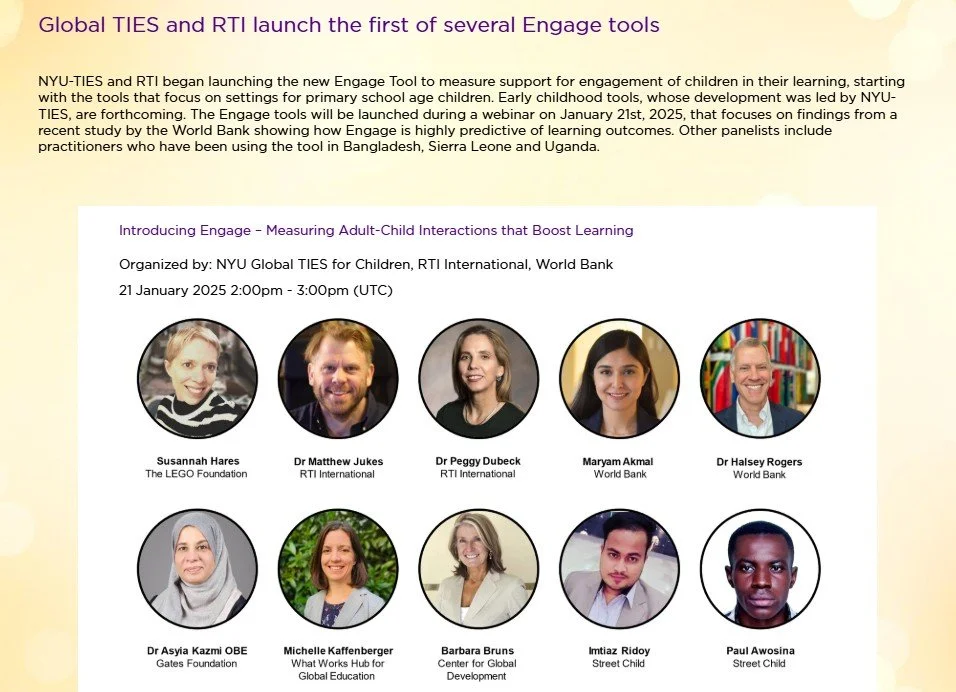Where We Work
Projects in Central & South America
The Engage project develops and validates tools to measure how adults support children’s learning through play across homes, schools, and diverse global contexts.
LEARN strengthens early- to mid-career scholars in Ghana and Colombia through training, mentorship, and research support to advance child development and education.
Play to Learn united Global TIES, LEGO, Sesame Workshop, BRAC, and IRC to bring play-based early learning to children and caregivers affected by global crises.
Ahlan Simsim, created by Sesame Workshop and the IRC, delivered early learning and care to children affected by conflict across the Middle East, transforming crisis response.
Projects in Middle East & North Africa
The Engage project develops and validates tools to measure how adults support children’s learning through play across homes, schools, and diverse global contexts.
Play to Learn united Global TIES, LEGO, Sesame Workshop, BRAC, and IRC to bring play-based early learning to children and caregivers affected by global crises.
Ahlan Simsim, created by Sesame Workshop and the IRC, delivered early learning and care to children affected by conflict across the Middle East, transforming crisis response.
EQUAL brought together research groups and NGOs to advance SDG4—quality, inclusive education—by training early-career researchers in MENA and SSA and strengthening local research capacity.
Global TIES for Children served as a resource partner to the World Learning–led QITABI 2 consortium in Lebanon, supporting efforts to build a more sustainable, self-reliant education system.
ERICC was a global partnership advancing research to improve education in conflict settings, identifying what works to ensure access, quality, and continuity, and connecting research to policy.
The 3EA E-Cubed project examined children’s holistic learning and development as well as program implementation in three crisis-affected contexts.
Global TIES for Children and Universidad de los Andes supported education stakeholders in Colombia and Peru to improve coherent measurement of holistic learning, SEL, teacher skills, and classroom practices.
NYU-TIES and the World Bank worked with Lebanon’s Ministry of Education to test a teacher development program aimed at replacing fragmented training with a clear framework of core practices.
Gobee is a game-based assessment tool helping teachers track children’s holistic learning and offer support, developed by WCH and NYU-TIES with Porticus.
From 2016–2023, Global TIES and the IRC led the 3EA initiative to develop tools and evidence to enhance children’s learning in crisis settings.
Projects in Sub-Saharan Africa
The Engage project develops and validates tools to measure how adults support children’s learning through play across homes, schools, and diverse global contexts.
LEARN strengthens early- to mid-career scholars in Ghana and Colombia through training, mentorship, and research support to advance child development and education.
EQUAL brought together research groups and NGOs to advance SDG4—quality, inclusive education—by training early-career researchers in MENA and SSA and strengthening local research capacity.
This project involved developing, testing and scaling-up supply and demand-side interventions to improve Kindergarten educational quality in Ghana.
The 3EA E-Cubed project examined children’s holistic learning and development as well as program implementation in three crisis-affected contexts.
From 2016–2023, Global TIES and the IRC led the 3EA initiative to develop tools and evidence to enhance children’s learning in crisis settings.
Projects in South and Southeast Asia
The Engage project develops and validates tools to measure how adults support children’s learning through play across homes, schools, and diverse global contexts.
Global TIES and icddr,b study caregivers and children in Rohingya and host communities to assess early-life impacts of war and displacement on development.
Play to Learn united Global TIES, LEGO, Sesame Workshop, BRAC, and IRC to bring play-based early learning to children and caregivers affected by global crises.
Ahlan Simsim, created by Sesame Workshop and the IRC, delivered early learning and care to children affected by conflict across the Middle East, transforming crisis response.




![Play to Learn [2018-2025]](https://images.squarespace-cdn.com/content/v1/5fa0560c3a27c834f6a6b5ac/1754074705612-JHGZ4SPGCVA2CHMS1Z3A/Play+with+a+Purpose+Event+Jan+2025.jpg)
![Ahlan Simsim [2019-2023]](https://images.squarespace-cdn.com/content/v1/5fa0560c3a27c834f6a6b5ac/2b2adc40-ac1c-40f1-a862-18c6b8b69ce3/GRP-p043-AS.jpg)
![Education Quality and Learning for All (EQUAL) [2016-2022]</span>](https://images.squarespace-cdn.com/content/v1/5fa0560c3a27c834f6a6b5ac/1677525733502-QX2LAIIML4CTJ6YCTQT3/EQUAL%2B-%2BMENA%2BConvening%2B2020.jpg)
![Quality Instruction Towards Access and Basic Education Improvement 2 (QITABI 2) Program [2022-2024]</span>](https://images.squarespace-cdn.com/content/v1/5fa0560c3a27c834f6a6b5ac/2351d71e-e3f7-4c51-9b44-315fa86c08ee/Qitabi-Logo.jpeg)
![Education Research in Conflict and Protracted Crisis (ERICC) [2021-2022]](https://images.squarespace-cdn.com/content/v1/5fa0560c3a27c834f6a6b5ac/1678195678593-NDZBDY0D9HQKAMOAFZVC/ERICC_%2BICF_%2Bthumbnail.jpg)
![3EA E-Cubed [2016-2023]](https://images.squarespace-cdn.com/content/v1/5fa0560c3a27c834f6a6b5ac/1682001838976-AMVPPKOSRE5PGWVVE2C3/SEL-main.jpeg)
![Strengthening Holistic Learning Measurement Systems in Colombia and Peru [2022-2024]</span>](https://images.squarespace-cdn.com/content/v1/5fa0560c3a27c834f6a6b5ac/1714656076348-5E9AS6SQOIXAHMY5Z40B/Screen+Shot+2024-05-02+at+09.18.56.png)
![Teacher Professional Development [2019-2020]</span>](https://images.squarespace-cdn.com/content/v1/5fa0560c3a27c834f6a6b5ac/d84f25ab-62bc-4dbc-8f12-fea9be37b04f/Pages+from+policy-insights-refugee-teachers-the-heart-of-the-global-refugee-response.pdf.png)
![Gobee: A Gamified Learning Measurement Tool [2022-2024]](https://images.squarespace-cdn.com/content/v1/5fa0560c3a27c834f6a6b5ac/8ea4c7a7-019b-4152-8396-038f002af1e2/Gobee_article-2.jpg.1262x662_q85_upscale.jpg)
![Education in Emergencies: Evidence for Action (3EA) [2016-2023]](https://images.squarespace-cdn.com/content/v1/5fa0560c3a27c834f6a6b5ac/1705595229481-UDPFHKB3XS3GOU5Y9EPV/AdobeStock_662048095.jpg)
![Quality Preschools for Ghana (QP4G) [2015-2019]</span>](https://images.squarespace-cdn.com/content/v1/5fa0560c3a27c834f6a6b5ac/1677527046858-Q8NJBU5T0EGLDJ28NY8Z/Screenshot%2B2022-03-08%2Bat%2B11.19.59.jpg)
